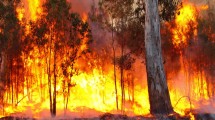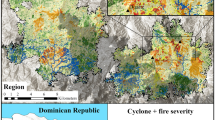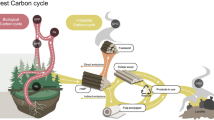Abstract
Frequent fires maintain nearly 50% of terrestrial ecosystems, and drive ecosystem changes that govern future fires. Since fires are dependent on available plant or fine fuels, ecosystem processes that alter fine fuel loads like microbial decomposition are particularly important and could modify future fires. We hypothesized that variation in short-term fire history would influence fuel dynamics in such ecosystems. We predicted that frequent fires within a short-time period would slow microbial decomposition of new fine fuels. We expected that fire effects would differ based on dominant substrates and that fire history would also alter soil nutrient availability, indirectly slowing decomposition. We measured decomposition of newly deposited fine fuels in a Longleaf pine savanna, comparing plots that burned 0, 1, 2, or 3 times between 2014 and 2016, and which were located in either close proximity to or away from overstory pines (Longleaf pine, Pinus palustris). Microbial decomposition was slower in plots near longleaf pines and, as the numbers of fires increased, decomposition slowed. We then used structural equation modeling to assess pathways for these effects (number of fires, 2016 fuel/fire characteristics, and soil chemistry). Increased fire frequency was directly associated with decreased microbial decomposition. While increased fires decreased nutrient availability, changes in nutrients were not associated with decomposition. Our findings indicate that increasing numbers of fires over short-time intervals can slow microbial decomposition of newly deposited fine fuels. This could favor fine fuel accumulation and drive positive feedbacks on future fires.



Similar content being viewed by others
Data availability
Data is available in Dryad: https://doi.org/10.5061/dryad.3n5tb2rf2.
References
Archibald S, Lehmann CER, Gomez-Dans JL, Bradstock RA (2013) Defining pyromes and global syndromes of fire regimes. Proc Natl Acad Sci 110:6442–6447. https://doi.org/10.1073/pnas.1211466110
Archibald S, Lehmann CER, Belcher CM, Bond WJ, Bradstock RA, Daniau A-L, Dexter KG, Forrestel EJ, Greve M, He T, Higgins SI, Hoffmann WA, Lamont BB, McGlinn DJ, Moncrieff GR, Osborne CP, Pausas JG, Price O, Ripley BS, Rogers BM, Schwilk DW, Simon MF, Turetsky MR, Van der Werf GR, Zanne AE (2018) Biological and geophysical feedbacks with fire in the Earth system. Environ Res Lett 13:033003. https://doi.org/10.1088/1748-9326/aa9ead
Balch JK, Bradley BA, Abatzoglou JT, Nagy RC, Fusco EJ, Mahood AL (2017) Human-started wildfires expand the fire niche across the United States. Proc Natl Acad Sci 114:2946–2951. https://doi.org/10.1073/pnas.1617394114
Bárcenas-Moreno G, Bååth E (2009) Bacterial and fungal growth in soil heated at different temperatures to simulate a range of fire intensities. Soil Biol Biochem 41:2517–2526. https://doi.org/10.1016/j.soilbio.2009.09.010
Bárcenas-Moreno G, García-Orenes F, Mataix-Solera J, Mataix-Beneyto J, Bååth E (2011) Soil microbial recolonisation after a fire in a Mediterranean forest. Biol Fertil Soils 47:261–272. https://doi.org/10.1007/s00374-010-0532-2
Beckage B, Platt WJ, Gross LJ (2009) Vegetation, fire, and feedbacks: a disturbance-mediated model of Savannas. Am Nat 174:805–818. https://doi.org/10.1086/648458
Bell R, Binkley D (1989) Soil nitrogen mineralization and immobilization in response to periodic prescribed fire in a loblolly pine plantation. Can J For Res 19(6):816–820. https://doi.org/10.1139/x89-125
Bowman DMJS, Balch JK, Artaxo P, Bond WJ, Carlson JM, Cochrane MA, D’Antonio CM, DeFries RS, Doyle JC, Harrison SP, Johnston FH, Keeley JE, Krawchuk MA, Kull CA, Marston JB, Moritz MA, Prentice IC, Roos CL, Scott AC, Swetnam TW, Van der Werf GR, Pyne SJ (2009) Fire in the earth system. Science 324:481–484. https://doi.org/10.1126/science.1163886
Bradford MA, Tordoff GM, Eggers T, Jones TH, Newington JE (2002) Microbiota, fauna, and mesh size interactions in litter decomposition. Oikos 99:317–323. https://doi.org/10.1034/j.1600-0706.2002.990212.x
Brown JK (1983) The “Unnatural Fuel Buildup” Issue. Symposium and Workshop on Wilderness Fire. USDA Forest Service Intermountain Forest and Range Experiment Station, pp 127–128
Brown JR (1998) Recommended chemical soil test procedures for the North Central Region. University of Missouri Columbia, Missouri Agricultural Experiment Station, Columbia
Brown SP, Callaham MA, Oliver AK, Jumpponen A (2013) Deep Ion Torrent sequencing identifies soil fungal community shifts after frequent prescribed fires in a southeastern US forest ecosystem. FEMS Microbiol Ecol 86:557–566. https://doi.org/10.1111/1574-6941.12181
Butler OM, Elser JJ, Lewis T, Mackey B, Chen C (2018) The phosphorus-rich signature of fire in the soil-plant system: a global meta-analysis. Ecol Lett 21:335–344. https://doi.org/10.1111/ele.12896
Butler OM, Lewis T, Rezaei Rashti M, Maunsell SC, Elser JJ, Chen C (2019) The stoichiometric legacy of fire regime regulates the roles of micro-organisms and invertebrates in decomposition. Ecology 100(7). https://doi.org/10.1002/ecy.2732
Carr SC, Robertson KM, Platt WJ, Peet RK (2009) A model of geographical, environmental and regional variation in vegetation composition of pyrogenic grasslands of Florida—Carr—2009—Journal of Biogeography—Wiley Online Library. J Biogeogr 36:1600–1612. https://doi.org/10.1111/j.1365-2699.2009.02085.x
Carson CM, Jumpponen A, Blair JM, Zeglin LH (2019) Soil fungal community changes in response to long-term fire cessation and N fertilization in tallgrass prairie. Fungal Ecol 41:45–55. https://doi.org/10.1016/j.funeco.2019.03.002
Certini G (2005) Effects of fire on properties of forest soils: a review. Oecologia 143:1–10. https://doi.org/10.1007/s00442-004-1788-8
Christensen NL (1977) Fire and soil-plant nutrient relations in a pine-wiregrass savanna on the coastal plain of North Carolina. Oecologia 31(1):27–44
Cornelissen JHC, Grootemaat S, Verheijen LM, Cornwell WK, van Bodegom PM, van der Wal R, Aerts R (2017) Are litter decomposition and fire linked through plant species traits? New Phytol 216:653–669. https://doi.org/10.1111/nph.14766
Czimczik CI, Schmidt MWI, Schulze E-D (2005) Effects of increasing fire frequency on black carbon and organic matter in Podzols of Siberian Scots pine forests. Eur J Soil Sci 56:417–428. https://doi.org/10.1111/j.1365-2389.2004.00665.x
Demirbaş A (2001) Relationships between lignin contents and heating values of biomass. Energy Convers Manag 42:183–188
Dooley SR, Treseder KK (2012) The effect of fire on microbial biomass: a meta-analysis of field studies. Biogeochemistry 109:49–61. https://doi.org/10.1007/s10533-011-9633-8
Ellair DP, Platt WJ (2013) Fuel composition influences fire characteristics and understorey hardwoods in pine savanna. J Ecol 101:192–201. https://doi.org/10.1111/1365-2745.12008
Ferrenberg S, O’Neill SP, Knelman JE, Todd B, Duggan S, Bradley D, Robinson T, Schmidt SK, Townsend AR, Williams MW, Cleveland CC, Melbourne BA, Jiang L, Nemergut DR (2013) Changes in assembly processes in soil bacterial communities following a wildfire disturbance. ISME J 7:1102. https://doi.org/10.1038/ismej.2013.11
Ficken CD, Wright JP (2017) Effects of fire frequency on litter decomposition as mediated by changes to litter chemistry and soil environmental conditions. PLoS ONE 12:e0186292
Gagnon PR, Passmore HA, Slocum M, Myers JA, Harms KE, Platt WJ, Paine CET (2015) Fuels and fires influence vegetation via above- and belowground pathways in a high-diversity plant community. J Ecol 103:1009–1019
Gilliam FS, Platt WJ (1999) Effects of long-term fire exclusion on tree species composition and stand structure in an old-growth Pinus palustris (Longleaf pine) forest. Plant Ecol 140(1):15–26
Glassman SI, Levine CR, DiRocco AM, Battles JJ, Bruns TD (2016) Ectomycorrhizal fungal spore bank recovery after a severe forest fire: some like it hot. ISME J 10:1228–1239. https://doi.org/10.1038/ismej.2015.182
Hansen PM, Semenova-Nelsen TA, Platt WJ, Sikes BA (2019) Recurrent fires do not affect the abundance of soil fungi in a frequently burned pine savanna. Fungal Ecol 42:1–7. https://doi.org/10.1016/j.funeco.2019.07.006
Harris RMB, Remenyi TA, Williamson GJ, Bindoff NL, Bowman DMJS (2016) Climate-vegetation-fire interactions and feedbacks: trivial detail or major barrier to projecting the future of the Earth system?: climate-vegetation-fire interactions and feedbacks. Wiley Interdiscip Rev: Climate Change 7:910–931. https://doi.org/10.1002/wcc.428
Hart SC, DeLuca TH, Newman GS, MacKenzie MD, Boyle SI (2005) Post-fire vegetative dynamics as drivers of microbial community structure and function in forest soils. For Ecol Manag 220:166–184. https://doi.org/10.1016/j.foreco.2005.08.012
Hooper D, Coughlan J, Mullen M (2008) Structural equation modelling: guidelines for determining model fit. Electron J Bus Res Methods 6:53–60
Johnson DW, Curtis PS (2001) Effects of forest management on soil C and N storage: meta analysis. For Ecol Manag 140(2–3):227–238
Kalies EL, Yocom Kent LL (2016) Are fuel treatments effective at achieving ecological and social objectives? A systematic review. For Ecol Manag 375:84–95. https://doi.org/10.1016/j.foreco.2016.05.021
Karberg NJ, Scott NA, Giardina CP (2008) Methods for estimating litter decomposition. Methods for estimating litter decomposition. In: Field measurements for forest carbon monitoring. Springer, Dordrecht, pp 103–111. https://doi.org/10.1007/978-1-4020-8506-2_8
Knicker H (2007) How does fire affect the nature and stability of soil organic nitrogen and carbon? A review. Biogeochemistry 85(1):91–118
Lenth R (2018) Emmeans: estimated marginal means, aka least-squares means. R package version 1.1. https://doi.org/10.18637/jss.v069.i01
Levi MR, Shaw JN, Wood CW, Hermann SM, Carter EA, Feng Y (2010) Land management effects on near-surface soil properties of Southeastern U.S. Coastal plain kandiudults. Soil Sci Soc Am J 74:258. https://doi.org/10.2136/sssaj2009.0015
Liu Z, Wimberly MC (2016) Direct and indirect effects of climate change on projected future fire regimes in the western United States. Sci Total Environ 542:65–75. https://doi.org/10.1016/j.scitotenv.2015.10.093
Manzoni S, Trofymow JA, Jackson RB, Porporato A (2010) Stoichiometric controls on carbon, nitrogen, and phosphorus dynamics in decomposing litter. Ecol Monogr 80:89–106. https://doi.org/10.1890/09-0179.1
Mehlich A (1984) Mehlich 3 soil test extractant: a modification of Mehlich 2 extractant. Commun Soil Sci Plant Anal 15:1409–1416. https://doi.org/10.1080/00103628409367568
Mugnani MP, Robertson KM, Miller DL, Platt WJ (2019) Longleaf pine patch dynamics influence ground-layer vegetation in old-growth pine savanna. Forests 10:389. https://doi.org/10.3390/f10050389
Neary DG, Klopatek CC, DeBano LF, Ffolliott PF (1999) Fire effects on belowground sustainability: a review and synthesis. For Ecol Manag 122:51–71
Noss RF, Platt WJ, Sorrie BA, Weakley AS, Means DB, Costanza J, Peet KR (2015) How global biodiversity hotspots may go unrecognized: lessons from the North American Coastal Plain. Divers Distrib 21:236–244. https://doi.org/10.1111/ddi.12278
Olson JS (1963) Energy storage and the balance of producers and decomposers in ecological systems. Ecology 44(2):322–331. https://doi.org/10.2307/1932179
Parnas Hanna (1975) Model for decomposition of organic material by microorganisms. Soil Biol Biochem 7(2):161–169. https://doi.org/10.1016/0038-0717(75)90014-0
Peay KG, Garbelotto M, Bruns TD (2009) Spore heat resistance plays an important role in disturbance-mediated assemblage shift of ectomycorrhizal fungi colonizing Pinus muricata seedlings. J Ecol 97:537–547. https://doi.org/10.1111/j.1365-2745.2009.01489.x
Platt WJ, Evans GW, Rathbun SL (1988) The population dynamics of a long-lived conifer (Pinus palustris). Am Nat 131:491–525
Platt WJ, Orzell SL, Slocum MG (2015) Seasonality of fire weather strongly influences fire regimes in South Florida Savanna-grassland landscapes. PLoS ONE. https://doi.org/10.1371/journal.pone.0116952
Platt WJ, Ellair DP, Huffman JM, Potts SE, Beckage B (2016) Pyrogenic fuels produced by savanna trees can engineer humid savannas. Ecol Monogr 86:352–372. https://doi.org/10.1002/ecm.1224
R Core Team (2020) R: a language and environment for statistical computing. R Foundation for Statistical Computing. Vienna, Austria. https://www.R-project.org/
Raison RJ (1979) Modification of the soil environment by vegetation fires, with particular reference to nitrogen transformations: a review. Plant Soil 51:73–108
Robertson PG, Paul EA (2000) Decomposition and soil organic matter dynamics. Methods in ecosystem science. Springer, New York
Rosseel Y (2012) lavaan: an R package for structural equation modeling. J Stat Soft 48(2):1–36. http://www.jstatsoft.org/v48/i02/
Rother MT, Huffman JM, Robertson KM, Orzell SL (2018) Cambial phenology informs tree-ring analysis of fire seasonality in coastal plain pine savannas. Fire Ecol 14:164–185. https://doi.org/10.4996/fireecology.140116418
Schmidt SK, Costello EK, Nemergut DR, Cleveland CC, Reed SC, Weintraub MN, Meyer AF, Martin AM (2007) Biogeochemical consequences of rapid microbial turnover and seasonal succession in soil. Ecology 88:1379–1385
Schnitzer SA, Klironomos JN, HilleRisLambers J, Kinkel LL, Reich PB, Xiao K, Rillig MC, Sikes BA, Callaway RM, Mangan SA, van Nes EH, Scheffer M (2011) Soil microbes drive the classic plant diversity–productivity pattern. Ecology 92:296–303. https://doi.org/10.1890/10-0773.1
Schoennagel T, Balch JK, Brenkert-Smith H, Dennison PE, Harvey BJ, Krawchuk MA, Mietkiewicz N, Morgan P, Moritz MA, Rasker R, Turner MG, Whitlock C (2017) Adapt to more wildfire in western North American forests as climate changes. Proc Natl Acad Sci 114:4582–4590. https://doi.org/10.1073/pnas.1617464114
Semenova-Nelsen T, Platt WJ, Patterson TR, Huffman J, Sikes BA (2019) Frequent fire reorganizes fungal communities and slows decomposition across a heterogeneous pine savanna landscape. New Phytol. https://doi.org/10.1111/nph.16096
Taylor BR, Parkinson D, Parsons WF (1989) Nitrogen and lignin content as predictors of litter decay rates: a microcosm test. Ecology 70:97–104
Toberman H, Chen C, Lewis T, Elser JJ (2014) High-frequency fire alters C:N:P stoichiometry in forest litter. Glob Change Biol 20(7):2321–2331
Wardle DA, Bonner KI, Barker GM (2002) Linkages between plant litter decomposition, litter quality, and vegetation responses to herbivores. Funct Ecol 16:585–595
Whitlock C, Shafer SL, Marlon J (2003) The role of climate and vegetation change in shaping past and future fire regimes in the northwestern US and the implications for ecosystem management. For Ecol Manag 178:5–21. https://doi.org/10.1016/S0378-1127(03)00051-3
Acknowledgements
The authors would like to thank Neil Jones, Tall Timbers Research Station and Land Conservancy, and the Wade Foundation for assistance with field support. The authors also thank Theo Michaels and Samuel Imel for lab assistance as well as Dr. Candace Davison at the Pennsylvania State Breazeale Nuclear Reactor for assistance with gamma sterilization anonymous reviewers. As Rumi said, life is a balance of holding on and letting go.
Funding
This work was supported by NSF grants DEB-1557000 to BAS and DEB-1556837 to WJP. This material is also based on work supported by the National Science Foundation Graduate Research Fellowship Program under Grant No. 1451148 to JRH. Any opinions, findings, and conclusions or recommendations expressed in this material are those of the author(s) and do not necessarily reflect the views of the National Science Foundation.
Author information
Authors and Affiliations
Contributions
WJP, BAS, and JMH conceived and designed the experiment. JRH, JMH, WJP, and BAS performed the experiment. JRH analyzed the data. JRH and BAS wrote the manuscript. WJP provided editorial advice.
Corresponding author
Additional information
Communicated by Amy Austin.
Electronic supplementary material
Below is the link to the electronic supplementary material.
Rights and permissions
About this article
Cite this article
Hopkins, J.R., Huffman, J.M., Platt, W.J. et al. Frequent fire slows microbial decomposition of newly deposited fine fuels in a pyrophilic ecosystem. Oecologia 193, 631–643 (2020). https://doi.org/10.1007/s00442-020-04699-5
Received:
Accepted:
Published:
Issue Date:
DOI: https://doi.org/10.1007/s00442-020-04699-5




